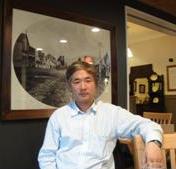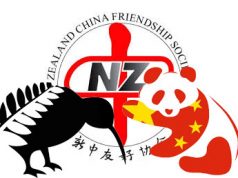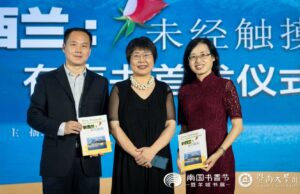ANNUAL GENERAL MEETING
An optional Chinese buffet meal, supplied by the Fujiyama Café, will follow the meeting at 7 pm. Orders for the $11.00 meal (please pay at the door) will be taken up till 6 pm. If you think you may be arriving late, please let the Secretary know in advance.
ALSO COMING UP THIS MONTH (see below for details)
3, 10, 17, 24 Mar, 3:15 pm Mandarin Corner, 20 Kelburn Parade
29 Mar, 4:00 pm NZCCRC China Seminar
29 Mar, 7:00 pm Chinese Film, 101 Wakefield St
31 Mar, 3:15pm Mandarin Corner, 20 Kelburn Parade
IDIOM OF THE MONTH (from George Mills)
不入虎穴, 焉得虎子 (bú rù hǔ xué, yān dé hǔ zǐ)
Without entering the tiger’s den, how does one capture the tiger’s cub?
NZCFS RAFFLE
With a wonderful first prize of two return tickets to China, provided by Air New Zealand to recognise the number of bookings we make through them for our tours, every dollar of the $5 ticket price goes to the Society, with $1 of those we sell going to our Branch. Tickets will be on sale at our meetings, with the draw done in Auckland on the Chinese National Day, 1 October, 2012.
We would be very pleased if anyone would like to take a book of 10 tickets to sell to others outside the society.
REPORT FROM LAST MEETING (by Luke Qin 秦瞳)
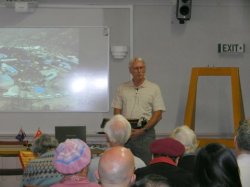
At our last monthly meeting in November, Dave Feickert, President of the Whanganui Branch, spoke on “From ‘faster is better’ to ‘better is faster’ in China and New Zealand”.
In light of the one year anniversary of the Pike River disaster, New Zealand coal mine safety expert Dave Feickert delivered a special presentation on mining and public safety in New Zealand and China. Mr Feickert said that both China and New Zealand are experiencing the throes of a critical period of transition.
According to Mr Feickert, although China ranks No.1 globally in terms of coal production & consumption, (with output exceeding 300 million tons in 2011), the Chinese mining industry is still reflective of its official status of a developing country. The Wang Jia Ling coal mine disaster in March 2010 saw 153 miners trapped underground and thanks to the quick response of the well experienced Chinese Rescue Team, 115 lives were saved from drowning. This fatal accident was the result of brazen mismanagement of the coal mine in which 2 reports of water seepage were ignored in the name of meeting production targets. 38 miners drowned underground when the well flooded.
Not surprisingly, owing to the pressure of meeting production targets of coking coal that is used in steelmaking, the Pike River coal mine located on New Zealand’s West Coast suffered a fatal gas explosion on 19 November 2010, killing 29 miners. According to Mr Feickert, the Pike River coal mine failed to detect & phase out hazards systematically which eventually amounted to an irreparable consequence. Mr Feickert said that every accident has its own peculiarities and there are different causes of gas explosions. In the aftermath of any major accident, the academic community in the world will invariably dissect the incident in the hope of finding a scientific solution to prevent similar disasters from happening ever again. However, the heartbreaking reality is that the spectre of human factors and management oversight still looms large behind the so-called accidents.
The Piker River disaster is also a result of the deficiencies in the New Zealand mine safety measurements. Mr Feickert said, the government abandoned the “Safety Triangle” in the 1990s only to be followed by negligence on mine safety by the Ministry of Labour and the disestablishment of mine safety inspectors which starved support for miners and management alike. Since the Pike River disaster, the New Zealand Government expediently set up a Royal Commission and hopes to finalise hearings in March 2012. It also re-established mine safety measures and conducted safety inspections for all underground mines.
On a positive note, New Zealand and China have a long history of collaboration on mine safety through resource sharing and frequent personnel exchanges that have led to gratifying results. However, New Zealand needs to markedly improve its mine safety systems if it is to catch up with the pacesetting Australia and the EU; China is coming along in leaps and bounds but there is still a long way to go. Since 2002, China’s coal production output has increased exponentially and the number of fatalities has dropped from 6995 to 2631 in 2009. “What we need to realise is that even if only one person is injured or killed, is one too many; China needs to reduce its accident rates by 30 fold to reach the level of developed countries.” According to Mr Feickert, China now has at least 600,000 miners suffering from Coal worker’s pneumoconiosis (CWP), which results in 6000 deaths every year. Reducing coal dust, flood risk, emission, and methane concentration in mines, increasing energy utilisation through the use of more energy efficient power stations and implementing a sound rehabilitation and compensation scheme for miners as set out by the Chinese State Council are pressing issues that need to be addressed with urgency.
ANNUAL GENERAL MEETING
The Annual General Meeting of the Wellington Branch of the New Zealand China Friendship Society Inc. will be held on Wednesday, 21st March 2012 at 5.45 pm at Connolly Hall, Guildford Terrace, Wellington.
Agenda
Minutes of the last Annual General Meeting, held on 16th March 2011
President’s Report Treasurer’s Report Election of Officers and Committee
Appointment of Auditor General Business
Nominations are invited for President, Vice President, Secretary, Treasurer and seven Committee members. The following current members are prepared to serve for another year:
Immediate Past President: Bernie Richmond Vice President: Ray Brownrigg
Secretary: Bruce Asher Committee: Bing Fon, Rosemary Jones, George Mills,
Luke Qin, Ellen Chuan Yang
Nominations should be made on the attached form, to be sent to the Secretary. Proxy forms can be obtained from the Secretary.
NEW MEMBERS: A warm welcome to Shona Butterfield and Karim Dickie.
CHINESE NEW YEAR BANQUET
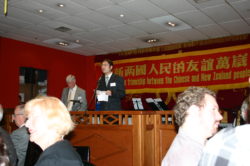
A good turnout of almost 100 members and friends welcomed in the Year of the Dragon at the Dragons Restaurant on Sunday evening, 29th January. It was a most lively and successful evening.
Attending as official representatives were Cheng Lei and Olga Wang (Chinese Embassy); Ian McKinnon (Deputy Mayor); Chris Elder, Andrew Bishop and Daniel Wai-Poi (Ministry of Foreign Affairs and Trade); Luo Hui (Confucius Institute); Steven Young (New Zealand Chinese Association); Linda Zhang (China and New Zealand Business Council); Hiromi Morris (Sister Cities).
Between courses of the delicious meal were brief addresses from Chargé d’Affaires Cheng Lei (pictured, right), Deputy Mayor Ian McKinnon and President Bernie Richmond. Our traditional quiz was presented this year by quizmaster Ray Brownrigg. Three tables tied for first place after a much harder quiz than usual (questions and answers supplied by George Mills).
Our thanks to the Chinese Embassy for donating the wine and quiz prizes.
INTERNATIONAL YEAR OF THE COOPERATIVE (from Dave Bromwich, North Island Vice-President)
2012 is United Nations International Year of the Cooperative.
Since 2006, NZCFS projects have provided training programmes that have assisted over 50 cooperatives in Gansu and Shaanxi to establish and build their management capacity and membership to a high level. To celebrate the UN International Year of the Cooperative, NZCFS, in conjunction with ICCIC (Gung Ho,) plan to select 4 of these cooperatives for an International Award for best cooperative practice. The selected cooperatives will also receive a small financial reward. Further details will be forthcoming from your NZCFS Projects team.
MANDARIN CORNER 汉语角 3.15pm – 5.00pm Saturdays during school terms
Mandarin Corner meets Saturdays (excluding school holidays), 3.15-5.00 pm, Seminar Room, 20 Kelburn Parade, Victoria University of Wellington. There is a topic for each session to stimulate interest.
Five sessions in March:
3 March – NZ Children’s Day (Sunday 4 March) 10 March – Plant Trees Day (12 March) Inspiration: It takes ten years to grow trees, but a hundred to rear/cultivate people.)
17 March – World Consumer Rights Day (15 March) 24 March – Going down to Yangzhou in the mist and flowers of spring (Li Bai) 31 March – Qingming Festival (4 April 2012, Ancestors Day)
Contact: Ellen Yang (04) 473-7558, [email protected]
CHINESE FILM 中国电影 Date: Thursday 29 March Time: 7.00pm – 9:30pm
Venue: Committee Room One, Wellington City Council, 101 Wakefield Street. Gold coin donation. The Chinese Film showings are starting later this year due to renovations to the WCC facilities. The film to be shown this month is likely to be Farewell My Concubine 霸王别姬 [170 minutes] with English subtitle.
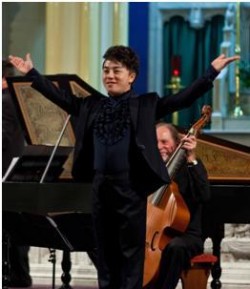
CONFUCIUS INSTITUTE NEWS (from the CIVUW team)
The Confucius Institute at Victoria University of Wellington was privileged to mark the beginning of 2012 with the arrival of our artist-in-residence, Xiao Ma. Xiao Ma (pictured right, performing at Wellington’s St Mary of the Angels Church) is China’s first countertenor and during January and February he performed a twelve-concert tour, giving audiences across New Zealand the chance to listen to his incredible vocal range and extensive repertoire. He performed in collaboration with an assortment of talented local musicians, celebrating the 40th anniversary of diplomatic relations between China and New Zealand.
The Confucius Institute at Victoria University of Wellington is also pleased to announce that a wide selection of language and cultural courses will be offered on an ongoing basis starting from March 2012. Language courses include Chinese for Business, Chinese for Travellers and Preparation for Studying in China. Cultural courses include Chinese Opera, Chinese Ink Painting, Martial Arts and Ballet. Our popular series of teacher training workshops will continue to be offered to teachers of Chinese language throughout 2012.
All courses will be offered on an ongoing basis starting from March. For further information and enrolment please visit our website www.victoria.ac.nz/ci or contact Mr. Liu Yaru at [email protected] or on +64 (04) 463-6248.
SUBSCRIPTION RENEWALS
Subscriptions for 2012 are now due. Please use the attached form. We prefer that you fill in all the details on the subscription form each year to confirm that we have your correct details.
MEETING DATES FOR 2012
Due to the illness of Douglas Day, we do not have speakers lined up for the whole of 2012 yet, and we would welcome any suggestions for potential speakers. However we do know the dates for our meetings, since we have had to book Connolly Hall. The dates we have chosen (and for which Connolly Hall is available) are: Wed 18 April, Wed 16 May, Sun 24 Jun, Sun 15 Jul, Wed 15 Aug, Wed 19 Sep, Wed 17 Oct, Wed 21 Nov.
FOLK HOUSE OF THE BAI PEOPLE
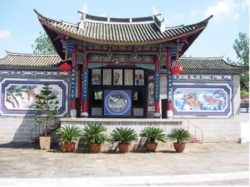
The folk house of the ethnic Bai people is typical of Bai folk architecture. It is seen in towns in China’s Sichuan and Yunnan provinces, where Bai people live. It is a two-storey building, with its layout usually represented as “three rooms and one screen wall”, namely, one master room and two annexes on both sides. The master room faces east, and is set dead against a screen wall, together forming an enclosed courtyard. The quintessence of the house lies in its gate tower, the foundation of which is usually built of bluestones. Erected on the foundation is a wooden gate with upswept eaves, which is elaborately decorated by exquisite clay, wood and stone carvings, as well as colour-drawn blue bricks. Some gate towers are extremely firm even without using a single nail. Another integral part of this folk house is the screen wall, the upper edge of which is fitted with upswept eaves built of blue tiles or coloured glaze tiles, and the middle part of which is embedded with a marble screen or written with auspicious expressions, with the surroundings being coloured drawing patterns of various types. The doors and windows are usually carved with a variety of auspicious patterns regarding myths. The main wall features a white upper part and grey lower part, with cornice on the wall being decorated with bright-coloured cummerbunds. The frontispieces and room corners are aesthetically drawn with exquisite water ink patterns including flowers, birds and landscapes. (from cultural-china.com, edited)
2012 NZCFS NATIONAL CONFERENCE – AUCKLAND MAY
The 2012 National Conference and AGM will be held from 18 – 20 May in Auckland, where the Society began 60 years ago. The theme is appropriately: “By honouring our past, we find our future”.
See the National President’s Notebook elsewhere on this website for further details.
XIAMEN UNIVERSITY(from Bruce Asher)
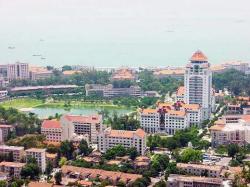
‘The best place in China is Xiamen and the best place in Xiamen is Xiamen University’. So said a foreign teacher after traveling all over China. Xiamen, Wellington’s sister city, is a beautiful city on the southeast coast of Fujian Province in the south of China, facing Taiwan across the strait. Xiamen has always been an important port for foreign trade. The climate is balmy and the air is fresh. The city was declared a Special Economic Zone in 1980 and has a thriving economy.
The architecturally stunning University was founded in 1921 by Mr Tan Kahkee, a renowned overseas Chinese leader. It is known for its welcoming attitude towards students from other countries especially those wishing to study the Chinese language. There are a number of scholarships available for foreign students. Currently there are more than 2000 overseas students in a total student population of over 30,000. Xiamen University has a number of research and academic links with Taiwan.
The Overseas Education College within the University offers Chinese language training programmes to overseas teacher groups and a lot of the Chinese language curriculum is delivered through distance education throughout South East Asia. There is a Chinese language course for every level, even the most elementary.
The College Website is http://oec.xmu.edu.cn For study of subjects other than the Chinese language see admissions.xmu.edu.cn. For the online Chinese programme see www.xmuoec.com
NZ CONTEMPORARY CHINA RESEARCH CENTRE CHINA SEMINAR
“NGO Development in China: Challenges and Opportunities”, Dr Dongfang Wang, China University of Political Science and Law. 4:00 pm Thursday 29 March 2012, 18 Kelburn Parade Room 204. For further information, contact [email protected] or phone (04) 463-9549.


